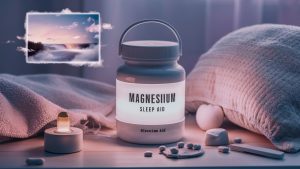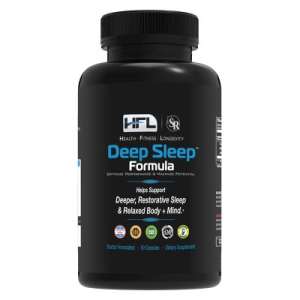Table of Contents
ToggleIntroduction
Exploring natural sleep aids for insomnia is a proactive step toward enhancing your sleep quality without relying on pharmaceuticals.
An astonishing 70 million Americans grapple with sleep disorders, which can severely affect overall health and daily functioning.
This guide delves into a variety of natural solutions that can help you regain control over your sleep patterns safely and effectively.
From herbal supplements to essential lifestyle adjustments, we will provide you with comprehensive insights into how you can improve your sleep naturally and wake up feeling refreshed every day.
Key Takeaways:
- Natural sleep aids can be a safe and effective alternative to prescription sleep aids.
- Incorporating sleep hygiene practices, managing stress and anxiety, regular exercise, and maintaining a well-balanced diet can contribute to better sleep quality.
- Consult with a healthcare provider before starting any sleep supplement to ensure safety and avoid potential interactions with medications.
- Find the right sleep aid for your individual needs.
- Addressing underlying factors and lifestyle changes can also contribute to better sleep.

Best Melatonin Sleep Aid for Insomnia
If you’re exploring natural sleep aids for insomnia, melatonin could be an excellent choice for you.
This hormone plays a vital role in regulating our sleep-wake cycles, and studies have found that melatonin supplements can effectively help those suffering from insomnia or jet lag.
It’s important to remember, though, that melatonin supplements can interact with certain medications.
Therefore, I recommend talking to your healthcare provider before starting any new supplement regimen.
Also, be mindful that the long-term effects of melatonin supplements haven’t been thoroughly studied, so it’s wise to use them cautiously.
Best Valerian Root Sleep Aid

If you’re exploring natural sleep aids for insomnia, valerian root stands out as a superb choice.
This herb has helped countless people relax and enhance their sleep quality for centuries.
However, it’s crucial to remember that valerian root may interact with alcohol and various medications.
If you’re currently on medication or dealing with health issues, please make sure to consult with your healthcare provider before starting on valerian root.
This ensures you use it safely and to its fullest potential in your sleep routine.
Best Magnesium Sleep Aid

Natural sleep aids for insomnia, such as magnesium supplements, can significantly enhance both the quality and quantity of your sleep due to their crucial role in muscle and nerve function.
Adding a magnesium sleep aid to your nightly routine could be the key to achieving better relaxation and rest.
It’s worth mentioning that while magnesium is fantastic for promoting sleep, high doses might cause a laxative effect.
Therefore, it’s essential to talk with your healthcare provider before beginning any new supplement regimen.
By integrating a magnesium supplement into your evening habits, you can tap into the natural benefits of magnesium to improve your sleep and wake up feeling refreshed.
This simple addition could really make a difference in your nightly rest!
Best Tea for Sleep

If you’re exploring natural sleep aids for insomnia, chamomile tea is a wonderful choice that offers a calming way to enhance your sleep.
Celebrated for its soothing properties, people have cherished chamomile tea for centuries as an effective remedy for sleeplessness.
The tea’s gentle aroma and subtle floral tones can calm your mind, reduce tension, and promote a serene night’s sleep.
Most individuals find chamomile tea safe and a delightful addition to their nightly routine, although it might be slightly less powerful than some other sleep supplements.
If you happen to be allergic to chamomile, it’s best to choose a different sleep aid to avoid any adverse reactions.
To make your chamomile tea experience even more enjoyable, consider adding a touch of honey or lemon for enhanced flavor.
By making this tea part of your bedtime ritual, you signal to your body that it’s time to relax and gear up for a good night’s rest.
So, for those in search of the perfect tea to improve sleep quality, Chamomile Tea could be exactly what you need to establish a peaceful and comforting nighttime routine.
Best Essential Oil for Sleep

Looking for natural sleep aids for insomnia? Consider trying lavender essential oil, a top choice known for its ability to improve sleep quality and promote relaxation.
Many people, including myself, have found that the calming and soothing properties of lavender help create a peaceful sleep environment.
To tap into the sleep-promoting powers of lavender essential oil, simply diffuse it in your bedroom each night before bed.
The gentle, soothing aroma helps set the stage for a good night’s sleep by creating a calm atmosphere that eases you into a restful state.
Some people may find they are sensitive or even allergic to the fragrance.
If you notice any adverse reactions, it’s best to stop using the oil and consult with a healthcare professional.
Always prioritize your well-being and safety when exploring new options like this.
Biofeedback for Sleep

Natural sleep aids for insomnia often include biofeedback therapy, a therapeutic approach that helps improve sleep health and overall performance.
This method empowers you to gain control over your physiological functions, such as heart rate, breathing, and muscle tension, which can be particularly effective for those suffering from chronic insomnia.
Biofeedback therapy teaches techniques that enable you to monitor and adjust your bodily responses in real time.
This immediate feedback helps you recognize and modify patterns in your physiological functions to achieve better sleep.
Many have found that understanding and controlling their body’s signals helps them fall asleep faster and enjoy more restful nights.
Although further research is ongoing to delve deeper into biofeedback’s effectiveness for sleep management, its current applications offer a safe, non-invasive, and medication-free option.
Consulting with a skilled professional who can customize the biofeedback experience based on your specific needs enhances the likelihood of significant improvements in your sleep quality.
This personal approach ensures that you can use biofeedback to its fullest potential as part of your journey towards overcoming insomnia.
How Does Biofeedback Work for Sleep?
When exploring natural sleep aids for insomnia, biofeedback therapy stands out as a proactive choice.
This method employs electronic sensors to actively monitor your physiological functions, such as heart rate or muscle tension.
As you watch these readings on a screen or hear them through sounds, you gain the ability to directly observe and analyze your body’s responses in real-time.
This increased self-awareness teaches you how to control these functions and achieve relaxation, helping you ease into a peaceful sleep.
A popular technique in biofeedback for improving sleep is heart rate variability training.
By consistently practicing deep, rhythmic breathing and participating in relaxation exercises, you can significantly influence your heart rate variability.
This not only ushers you into a deeper state of calm but is also particularly effective in preparing your body and mind for sleep.
Additionally, you might try EMG biofeedback, which focuses on reducing muscle tension, or thermal biofeedback to better regulate your body temperature—both excellent strategies for fostering a good night’s rest.
Benefits and Considerations
When considering biofeedback for sleep, it’s important to weigh the potential benefits against individual circumstances and preferences. Here are some key points to keep in mind:
- Biofeedback provides a drug-free approach to managing insomnia and improving sleep quality.
- It empowers individuals by giving them control over their bodily functions and promoting self-awareness.
- Regular biofeedback sessions can help individuals develop long-term skills to manage sleep disturbances.
- Biofeedback for sleep may be particularly beneficial for individuals who prefer non-pharmacological interventions or have concerns about medication side effects.
- However, it may not be suitable for everyone, and individual results can vary.
Overall, biofeedback therapy for sleep offers a potential avenue for individuals seeking non-pharmacological approaches to manage insomnia naturally. Collaborating with a qualified professional can guide the process and optimize the benefits of this therapeutic technique.
Yoga for Sleep
If you’re exploring natural sleep aids for insomnia, consider incorporating yoga into your nightly routine.
Yoga is not only a soothing and effective mind-body practice, but it also enhances sleep quality and promotes overall relaxation through a holistic approach that reduces stress and fosters calmness.
For example, try adding simple yoga poses like the neck roll to your bedtime routine.
This involves gently rotating your neck in circular motions, which can alleviate tension and stiffness in your neck and shoulders, helping you relax.
Similarly, the shoulder roll can be particularly soothing.
By rolling your shoulders slowly in circles, you allow upper body tension to melt away, which readies your muscles for a peaceful night’s sleep.
Don’t overlook the benefits of other stretching exercises, such as forward bends or child’s pose.
These poses are great for calming your mind, easing body tension, and boosting circulation, all of which contribute to a tranquil bedtime atmosphere.
It’s crucial to perform these yoga poses slowly and with gentle movements to maintain a relaxed heart rate.
Concentrate on deep breathing to enhance your relaxation further.
It’s important to note that while yoga is generally beneficial, it might not provide the same level of relief for everyone. Women going through menopause or post-menopause, or those dealing with breast cancer, might find varying results.
Overall, making yoga a part of your evening ritual can significantly improve your sleep quality. It helps you unwind and physically prepares you for a restful night, letting you wake up refreshed and rejuvenated.
Hypnosis for Sleep
Natural sleep aids for insomnia can significantly enhance your sleep quality, and hypnosis is one of these powerful mind-body practices that actively improves sleep and addresses the root causes of insomnia.
By creating a state of deep relaxation and increased openness, hypnosis actively works to reshape negative thought patterns, ease anxiety, and encourage a peaceful night’s sleep.
Studies have consistently found hypnosis to be an effective strategy for alleviating sleep disorders and boosting both sleep quality and duration.
It shows particular promise for those dealing with chronic insomnia, difficulty in falling asleep, or frequent awakenings during the night.
With the rise of digital technology, self-hypnosis apps have gained popularity, offering you the convenience of guided hypnosis sessions in your own home and on your own time.
However, keep in mind that hypnosis doesn’t work the same way for everyone, and the results can vary from person to person.
For complex sleep issues or underlying health conditions, it’s wise to consult with a professional hypnotherapist to get the most tailored and effective treatment.
Look for apps that provide well-constructed, research-backed hypnosis sessions designed specifically for sleep-related challenges.
Lavender for Sleep
If you’re exploring natural sleep aids for insomnia, consider the calming effects of lavender, a well-known remedy that can enhance your sleep quality.
Many have found that using lavender essential oil before bed or sipping lavender tea can significantly ease insomnia symptoms and promote a more restful night.
To harness the soothing aroma of lavender essential oil, try adding a few drops to your bedroom diffuser or directly onto your pillow as you prepare for sleep.
This simple practice can transform your bedtime routine into a tranquil ritual.
For a warming nightcap, brew a cup of lavender tea by steeping dried lavender flowers in boiling water for 5-10 minutes.
Drinking this fragrant infusion slowly before bed can help calm your mind and relax your body.
However, it’s prudent to consult with your healthcare provider before incorporating lavender into your nightly routine, as it can influence sex hormones and interact with certain medications.
Ensuring that lavender is a safe and effective addition to your sleep strategy is essential for your overall health and well-being.
Chamomile for Sleep
Chamomile tea is a key ingredient in many teas marketed as natural sleep aids for insomnia.
Although scientific evidence might not fully confirm its effectiveness, people have used chamomile for centuries to relax and get a good night’s sleep.
Many find that sipping chamomile tea before bed enhances their sleep quality. Remember, though, the benefits might decrease with long-term use.
Before you start using chamomile tea regularly, it’s wise to consider any possible interactions with your medications.
Always consult your healthcare provider to ensure that this soothing tea complements your health regimen safely.

Conclusion
Exploring natural sleep aids for insomnia can be a deeply personal journey.
As you seek effective solutions to improve your sleep quality, it’s helpful to consider various options like melatonin, valerian root, magnesium, tea, and essential oils.
These natural alternatives provide a healthy counterbalance to prescription medications and fit well within a holistic sleep health strategy.
Remember, it’s vital to tailor your choice of sleep aid to your personal health needs and consult with a healthcare professional before starting any new supplement.
This ensures that the sleep aid you choose is safe and will not interfere with any existing medical conditions or medications you may be taking.
A healthcare provider can also advise you on the correct dosages and alert you to any potential interactions.
Addressing the underlying causes of your insomnia is just as important as choosing the right sleep aid.
Practices such as improving your sleep hygiene, managing stress and anxiety, and maintaining a well-balanced diet are crucial.
These lifestyle changes can enhance the effectiveness of natural sleep aids, improving your overall sleep quality and helping you achieve long-term sleep health.
In conclusion, natural sleep aids are a valuable tool in managing insomnia, but they should be used wisely.
Consulting healthcare professionals, considering your individual needs, and incorporating good sleep practices are essential steps to finding the most effective sleep aid for you and enjoying peaceful, restful nights.
FAQ
What are some natural sleep aids for insomnia?
Some natural sleep aids for insomnia include melatonin, valerian root, magnesium, tea, and essential oils.
Are over-the-counter sleep aids effective?
Over-the-counter sleep aids can be effective for short-term sleep issues. However, it’s important to address the underlying causes of sleep problems for long-term improvement.
What is the best sleep aid for adults?
The best sleep aid for adults can vary depending on individual needs and preferences. Some popular options include melatonin supplements, valerian root extract, and magnesium supplements.
Are there sleep aids for children?
It’s important to consult with a healthcare provider before giving any sleep aids to children. Some natural options that may be appropriate for children include chamomile tea or lavender essential oil (under supervision).
Are there sleep aids for the elderly?
Sleep aids for the elderly should be discussed with a healthcare provider, as they may have specific considerations. Melatonin, valerian root, and magnesium supplements are generally considered safe for older adults.
Is melatonin a recommended sleep aid?
Melatonin supplements can be helpful for falling asleep and staying asleep longer. Thorne Research’s Melaton-3 is a recommended option for chronic insomnia or overcoming jet lag.
What is the best valerian root sleep aid?
GNC Herbal Plus Valerian Root Extract provides 500 milligrams of valerian root extract per capsule and has been tested and approved by ConsumerLab.com.
What is the best magnesium sleep aid?
Nature Made’s Magnesium Citrate offers 250 milligrams of magnesium citrate per capsule and is USP verified.
What is the best tea for sleep?
Yogi Comforting Chamomile Tea is a popular choice for promoting relaxation and better sleep.
What is the best essential oil for sleep?
Plant Therapy’s Lavender Essential Oil is a safe and effective option for promoting better sleep.
Can biofeedback help with sleep?
Biofeedback therapy has been used to help with various conditions, including chronic insomnia. Working with an experienced professional is recommended.
Can yoga improve sleep?
Yoga has been shown to improve sleep by reducing stress and promoting relaxation. Simple yoga poses can be incorporated into a bedtime routine.
Can hypnosis be used for sleep?
Hypnosis can be an effective method for addressing underlying causes of sleep issues. Self-hypnosis apps are available, but consulting with a professional is recommended.
How can lavender help with sleep?
Lavender has a calming effect and can improve sleep quality. Using lavender essential oil before bed or drinking lavender tea can promote relaxation and better sleep.
Does chamomile tea improve sleep?
Chamomile tea has traditionally been used to induce relaxation and improve sleep quality. It can be part of a bedtime routine, but be aware of potential interactions with medications.
What are the best natural sleep aids for insomnia?
Some of the best natural sleep aids for insomnia include melatonin, valerian root, magnesium, tea, and essential oils. It’s important to consult with a healthcare professional and consider individual needs and potential interactions.










